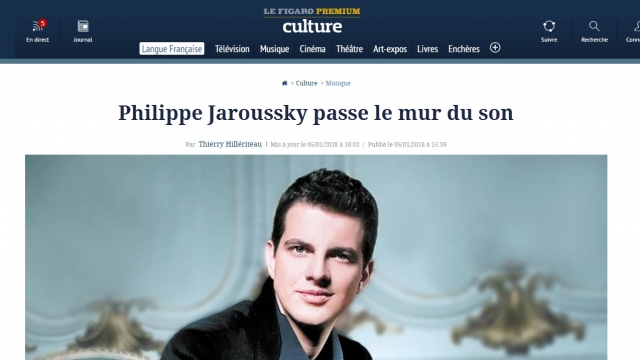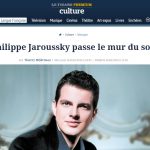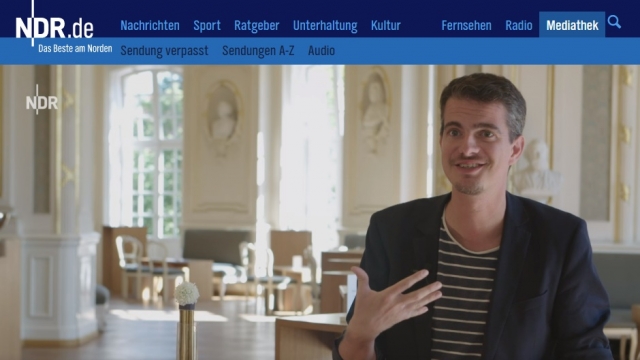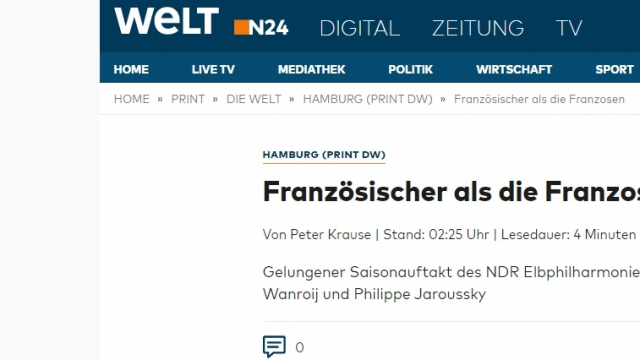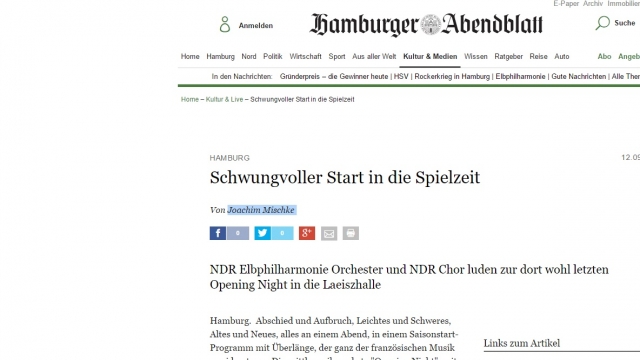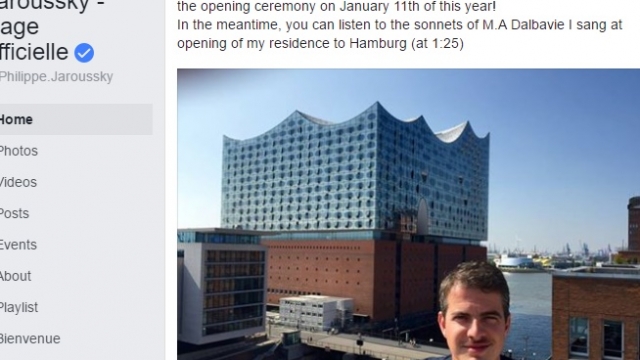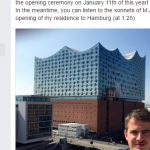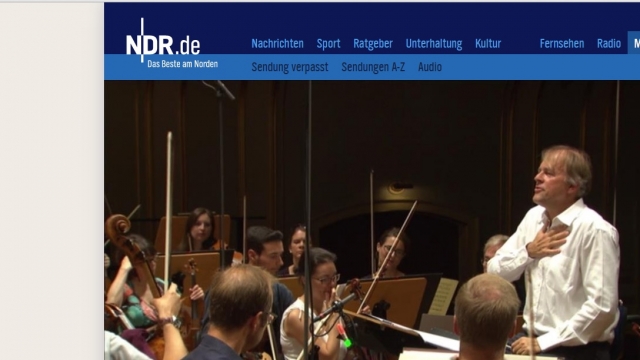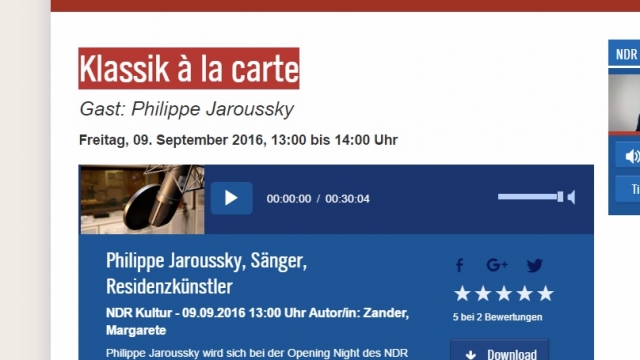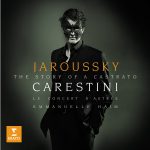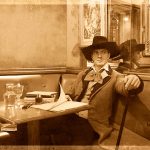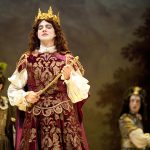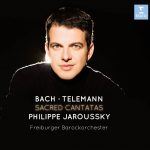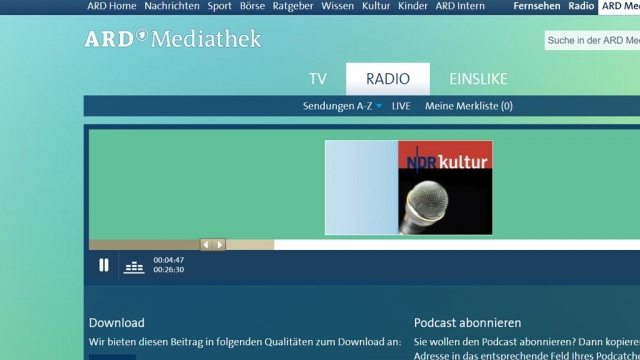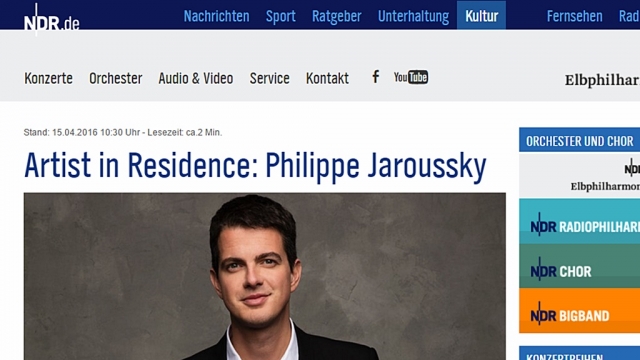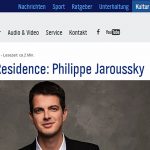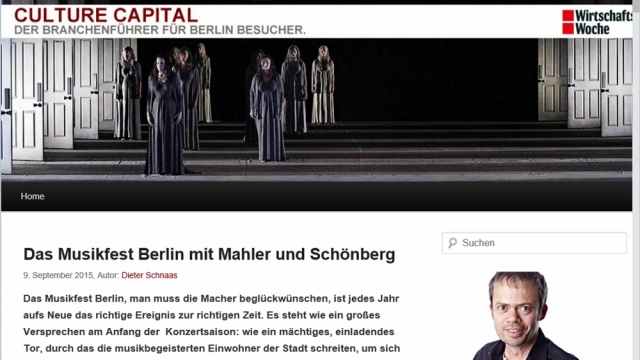2016-09-09, NDR Kultur, Klassik à la carte, interview by Margarete Zander
*This is a fan transcript/translation, no infringement of copyright is intended. Transcript/translation: *L*
Source/Podcast link: [x]
Am Mikrofon Margarete Zander. Sie wird mit einem ganz besonderen Prickeln erwartet: die Opening Night der Konzertsaison 2016/2017 des NDR Elbphilharmonie Orchesters. Heute Abend ist es so weit, da trifft Thomas Hengelbrock sein Publikum sozusagen ganz persönlich. Er hat eingeladen zu einer “französischen Affäre”, einer “Affaire française” und bringt Aufregendes mit. Und sein Stargast ist in diesem Jahr Philippe Jaroussky und das Beste: Der Countertenor ist heute unser Gast. Herzlich Willkommen, bonjour und bienvenu!
Dankeschön, ich bin sehr froh, hier zu sein!
Your host is Margarete Zander. It’s been awaited with a lot of anticipation: the opening night of the concert season 2016/2017 of the NDR Elbphilharmonie Orchester. Tonight, it’s finally going to happen, and Thomas Hengelbrock is going to meet his audience in person, so to speak. He invited us to a “French affair,” an “Affaire française,” and he brought an exciting program. His special guest this year is Philippe Jaroussky, and the best thing about it: the countertenor is our guest today. Herzlich Willkommen, bonjour and bienvenu!
Thank you, I’m happy to be here.
[1 min]
[Speaks quite slowly:] Je suis heureux que vous parlez allemand – Ich bin sehr glücklich, dass Sie Deutsch sprechen, denn dann muss ich mein Schulfranzösisch nicht bemühen, das ich erst noch üben müsste. Wie kommt das, dass Sie Deutsch sprechen?
Ich habe es in der Schule gelernt und anschließend habe ich alles vergessen. Aber jetzt, mit meinem Beruf, sollte ich alle Sprachen ein bisschen sprechen – ein bisschen Italienisch, ein bisschen Spanisch, ein bisschen natürlich Englisch, dann, … es kommt wieder, aber ich muss noch Fortschritte machen. [laughs]
[Speaks quite slowly:] Je suis heureux que vous parlez allemand, … I am very happy you speak German, so I don’t have to try to remember the French back from my school days I would have to brush up first. How come that you speak German?
I learned it in school, and afterwards, I forgot everything. However, now, with my job, I should be able to speak a lot of languages, a little bit – a bit of Italian, a bit of Spanish, a bit of English, of course, … it’s coming back, but there is much room for improvement yet! [laughs]
Sie haben jetzt deutsche Kantaten aufgenommen, …
Ja, und ich hatte dieses Projekt sehr lange Zeit geplant und jetzt wird es in einem Monat kommen.
… wird es veröffentlicht, und wir haben schon einen Titel daraus, Bach- und Telemann-Kantaten, …
Ja, meine erste Aufnahme in Deutsch.
So you have been recording German cantatas, …
Yes, and I have been planning this project for a very long time, and now it’s going to be released, …
… in about a month, and we will be airing one track already, cantatas by Bach and Telemann, …
Yes, my first recording in German.
Wunderbar, aber heute kommen Sie gerade aus der Probe mit Thomas Hengelbrock und dem NDR Elbphilharmonie Orchester – wie war das?
[2 min]
Toll, toll! Das ist das erste Mal, dass wir zusammenarbeiten, ich und Thomas Hengelbrock. Natürlich kenne ich seine Arbeit vor allem was Barockmusik angeht, aber er ist nicht ausschließlich ein Dirigent für Barockmusik. Und was toll ist an diesem Stück von Marc-André Dalbavie: Es ist für meine Stimme komponiert und es ist in Französisch, und … es ist moderne Musik, aber Marc-André benutzt die Countertenorstimme dafür, und natürlich versteht Thomas Hengelbrock diesen Punkt sehr sehr gut als Auch-Barockmusiker.
Wonderful! Today you just arrived from a rehearsal with Thomas Hengelbrock and the NDR Elbphilharmonie Orchester – how was it?
Great, it was great! It’s the first time we’re working together, Thomas Hengelbrock and I. Of course I know his work, especially concerning Baroque music. However, he isn’t exclusively a conductor for Baroque. The great thing about this piece by Marc-André Dalbavie is: it is composed for my voice, and it’s in French, and, … it is contemporary music, but Marc-André uses the countertenor voice for it, and, of course, Thomas Hengelbrock with his background understands this point very very well.
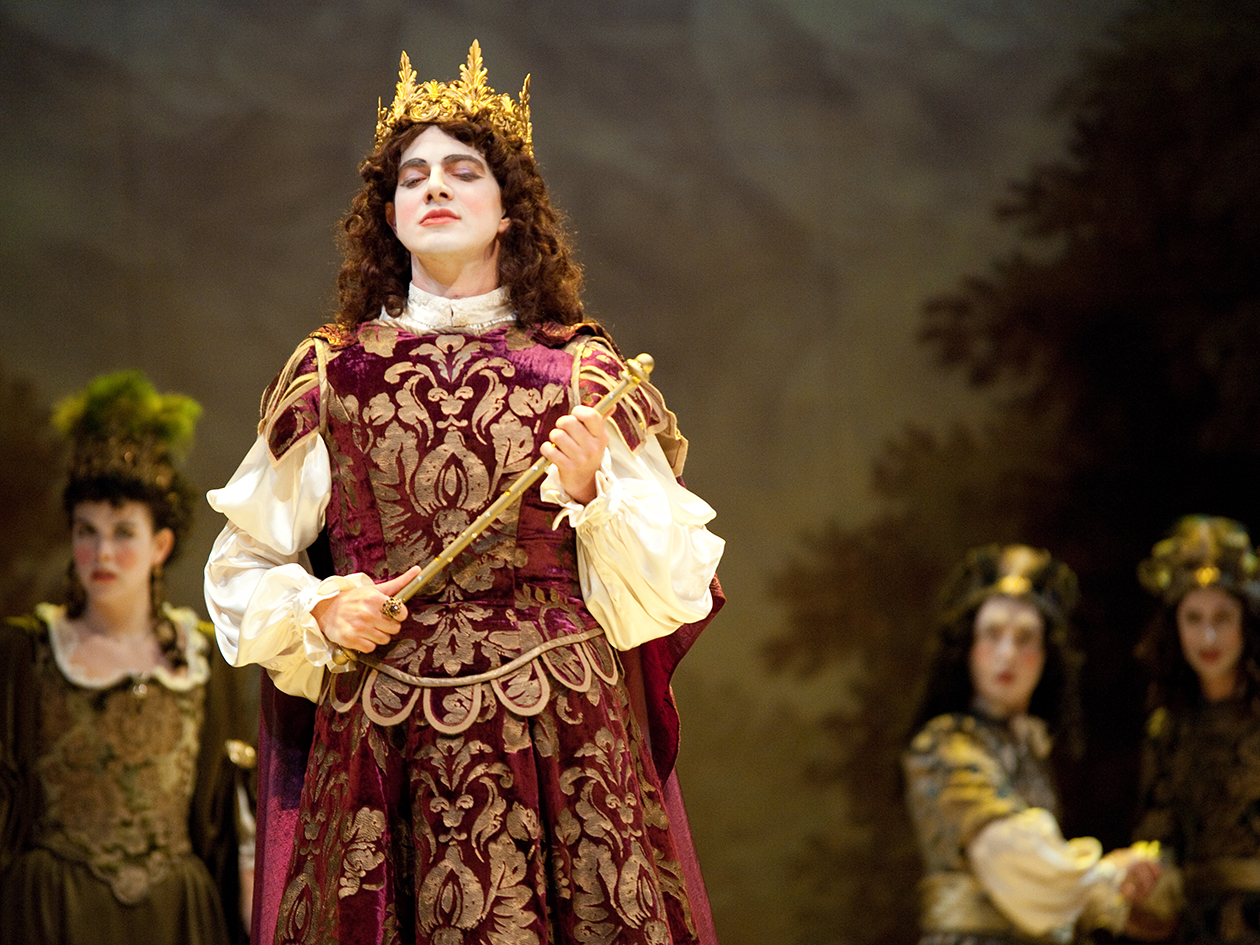
Und damit sind wir ja schon mitten im Thema: Sie haben Thomas Hengelbrock zum ersten Mal für diese Proben getroffen, aber Sie haben schon eine sehr enge Verbindung zu ihm, und zwar geht die über die Oper “Niobe” von Agostino Steffani. Hengelbrock hat diese Oper 2008 in Schwetzingen aufgeführt und Sie haben sie aufgenommen, in Boston.
[3 min]
Ja genau, und Sie haben Recht zu sagen, wirklich, Thomas Hengelbrock hat Steffani entdeckt und “Niobe”, seine beste Oper, kann man sagen. Und ich hatte die Chance, die Rolle von Anfione in “Niobe” zu singen, zum ersten Mal in Boston, mit Stephen Stubbs und Paul O’Dette. Sie haben zur gleichen Zeit die Partitur entdeckt, und wir haben die Oper auf der Bühne gespielt und sie zum ersten Mal auf CD aufgenommen. Darauf bin ich sehr sehr stolz.
Which gets us right to the topic: You and Thomas Hengelbrock first met each other for the rehearsals here, but you already have quite a close connection to him, via the opera “Niobe” by Agostino Steffani. Hengelbrock has been performing this opera in 2008 at Schwetzingen, and you recorded it, in Boston. [translator’s note: I think it was performed in Boston, but recorded in Germany, not with the exact same cast either.]
Yes, exactly, and it’s only fair to give credit to Thomas Hengelbrock for discovering Steffani, and the the latter’s probably best opera, ”Niobe.” I had the chance to sing the role of Anfione, first in Boston, with Stephen Stubbs and Paul O’Dette. They discovered the score at the same time as Hengelbrock, and we performed the opera on stage, and recorded it as a world premiere. I’m very proud of that.
[Trà bellici carmi]
[7 min]
“Trà bellici carmi”, die Arie des Anfione, aus “Niobe, regina di Tebe” von Agostino Steffani, wir hörten das Boston Early Music Festival Orchester unter der Leitung von Paul O’Dette und Stephen Stubbs und der Countertenor, das war Philippe Jaroussky, und er ist heute unser Gast in “Klassik à la carte” auf NDR Kultur. Dieser Titel gefällt Ihnen ganz besonders, …
Ja, ich sollte erwähnen, dass diese Arie unglaublich schwer ist, und ich erinnere mich daran, dass ich vielleicht zwei Monate gebraucht habe, um die Koloraturen zu lernen, die sind sehr sehr kompliziert.
Haben Sie Tricks?
Nein, lernen, lernen, üben, üben. Aber das war nicht so einfach. Es ist ganz anders geschrieben als Händel oder Vivaldi.
“Trà bellici carmi,” Anfione’s aria, aus “Niobe, regina di Tebe” von Agostino Steffani, we have been listening you the Boston Early Music Festival Orchestra, conducted by Paul O’dette and Stephen Stubbs, and the countertenor was Philippe Jaroussky. He’s our guest today at “Klassik à la carte” on NDR Kultur. You are particularly fond of this track, …
Yes. Maybe I should mention that this aria is particularly hard to sing. I remember it took me about two months to learn the coloratura parts, they are very very complicated.
Do you have any tricks?
No, learn, learn, practise, practise, … However, it wasn’t simple. It’s entirely different from Händel or Vivaldi.
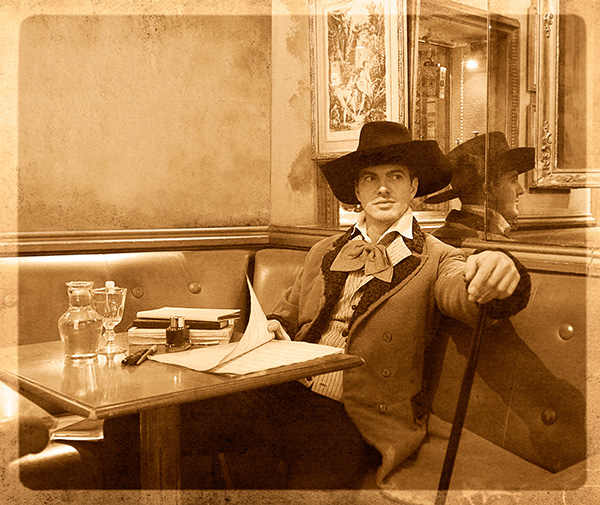
Wenn Sie dann so etwas singen, was wir gleich hören werden, “En sourdine” von Claude Debussy, müssen Sie dann Ihr Register umprogrammieren? Ist das so, wie wenn ein Geiger von der Barockgeige plötzlich einen anderen Bogen nimmt, einen aus der Romantik?
[8 min]
Nicht so viel. Etwas passiert, natürlich, weil ich Franzose bin. Schon beim französisch Singen ändert sich vieles. Ich glaube, was ich probiere, ist, den Text zu singen und natürlich, diese Lieder, die französischen Lieder, sind sehr bequem für mich, denn Sie brauchen kein großes Drama zu machen. “En sourdine”, zum Beispiel, beginnt mit “Calmes dans le demi-jour” – “ruhig wie ein Nachmittag”, und es gibt kein Drama darin. Und das ist eine sehr gute Schule für Sänger, die von großen Opern kommen. Es ist wie frische Luft, diese Lieder zu singen. Es ist ähnlich wie Schubert in deutscher Sprache. Und Sie müssen glaube ich diesen operatischen Trick vergessen. Und deshalb, … ich mag es sehr, dieses Repertoire zu singen.
[9 min]
When you are singing something like we’re about to listen to, “En sourdine” by Claude Debussy, do you have to “reprogram” your register? Is it a bit like a violinist switching from a baroque violin to a modern bow, one from the Romantic period?
Not so much. Something happens, of course, because I am French. Even by switching to singing in French, it already changes a lot of things. I think what I am trying to do is to sing the words, and of course, these songs – the French songs – are very comfortable for me because they don’t need any big drama. “En sourdine,” for example, starts with “Calmes dans le demi-jour” – “calm like an afternoon,” and there is no dama. And that’s a good practise for singers who come from the big opera stage. Singing these songs is like breathing fresh air. It is the counterpart to Schubert in German reperoire. You have to forget this operatic way of singing there, I believe. Because of that, … I like singing this repertoire a lot.
Haben Sie früher viel Chansons gehört in Ihrer Jugend? Hat Ihre Mutter Chansons gesungen? Welche Rolle spielte das?
Meine Eltern haben, vielleicht wie viele Franzosen, Edith Piaf und Jacques Brel gehört, und es stimmt, dank dieser Aufnahmen habe ich vielleicht mehr diese sehr populären Sänger gehört als Opernsänger, das stimmt.
When you were young, have you been listening to chansons a lot? Did you mother sing any chansons? Which role did it play?
Like many French people, my parents listened to Edith Piaf and Jacques Brel, and yes, it’s true, thanks to these recordings, I think I listened more to these popular singers than to opera, that’s correct.
“Une affaire française” heißt es heute Abend mit Thomas Hengelbrock und dem NDR Elbphilharmonie Orchester und da passt ein Stück sehr gut, das ein französischer Komponist, wir haben es vorher schon angesprochen, für Sie komponiert hat, Marc-André Dalbavie. Ihr einziges Stück, das sie mit großem Orchester singen – wir fühlen Sie sich da?
[10 min]
Vorher ich hatte Angst, ich kannte das Stück noch nicht. Aber jetzt, … es ist so gut geschrieben, die Balance zwischen mir und dem Orchester ist ganz einfach. Und wissen Sie, ich glaube, ich kann Probleme haben mit einem Barockorchester. Wenn das Barockorchester zu laut spielt, dann ist [auch] das zu laut, aber wenn ein großes philharmonisches Orchester piano spielt, gibt es kein Problem mit meiner Stimme. Was da wichtig ist für mich ist, einen Dirigenten zu haben, der diesen Punkt sehr gut versteht. Am Anfang hatte ich eine sehr kleine Stimme. Jetzt habe ich sehr viel gearbeitet. Natürlich habe ich keine große Stimme – ich werde nie Wagner singen oder diesen Typ Repertoire, aber ich glaube, dass meine Stimme jetzt klingt mit mehr Freiheit und mit mehr Obertönen und ich glaube, das reicht. Und das Wichtigste ist nicht, laut zu singen, glaube ich, natürlich.
… sondern die Bedeutung zu singen.
… die Bedeutung zu singen.
Tonight it is “Une affaire française,” together with Thomas Hengelbrock and the NDR Elbphilharmonie Orchester, so a piece written for you by a French composer, Marc-André Dalbavie, is a perfect match. It’s your only piece you perform with a big orchestra – how does it make you feel?
At the start, when I didn’t know the piece yet, I was afraid. But now, … it is written so well; finding a balance between me and the orchestra is really simply. And you know, I think I can be in trouble with a Baroque orchestra. If a Baroque orchestra is playing too loud, it’s too loud as well, but when a big philharmonic orchestra plays piano, I have no problem whatsoever with my voice. What is important for me is to have a conductor who understands this. At the start, my voice was very small. In the meantime, I worked a lot. Of course I haven’t got a big voice – I am never going to sing Wagner or this kind of repertoire, but I think that nowadays, my voice sounds more free, and has more overtones, and I think that’s enough. And of course, the most important thing isn’t to be loud, I believe.
… but to transport the meaning.
… to transport the meaning.
[En sourdine]
[14 min]
“En sourdine” von Claude Debussy, gesungen von Philippe Jaroussky und begleitet am Klavier von Jérôme Ducros und dem Quatuor Ébène. Sie haben sich das gewünscht, diese kleine Form, Sie lieben Kammermusik, Philippe Jaroussky, …
… ja und ich liebe das Ébène-Quartett. Sie sind Freunde, und natürlich, es gibt nicht so viel für Quartett und Klavier und Stimme, und zum Beispiel, diese Debussy-Lieder hat Jérôme Ducros für uns arrangiert.
“En sourdine,” by Claude Debussy, sung by Philippe Jaroussky, accompanied at the piano by Jérome Ducros and the Quatuor Ébène. You have been wanting this, this small arrangement, you love chamber music, Philippe Jaroussky, …
… yes and I love the Quatuor Ébène. They are friends, and of course, there isn’t a vast repertoire for string quartet and voice. For example, the arrangement of these Debussy songs is by Jérome Ducros.
Der Text ist von Paul Verlaine, das ist der Dichter der Musiker und Komponisten, und ich darf mal ein kleines Stück zitieren, da heißt es in diesem Text aus En sourdine: “Dass unser Herzendrang hinschmilzt und zärtlich schweigt in Duft, der sehsuchtsbang von Busch und Fichte steigt.”
[15 min]
Es klingt auch gut auf Deutsch! Toll! [laughs]
The words are by Paul Verlaine, the poet of musicians and composers, and let me quote a tiny excerpt from “En sourdine”: “Dass unser Herzendrang hinschmilzt und zärtlich schweigt in Duft, der sehsuchtsbang von Busch und Fichte steigt.”
[Hearts and souls blend there
And senses’ ecstasy,
With the vague languor
Of pine and strawberry.]
It even sounds good in German! Great! [laughs]
Mochten Sie schon immer gern Gedichte lesen und hören?
Ja, und das ist einfach für uns Musiker, vielleicht ist es für einen Schauspieler schwerer. Weil wir haben die Musik von Debussy, von Fauré, aber wenn ich nur den Text lesen dürfte, das wäre nicht so einfach für mich. Natürlich, wir haben die Musik, so schöne Musik, und als ich die erste Aufnahme französischer Lieder in Frankreich gemacht habe, waren die Reaktionen ein bisschen “Ah, ein Countertenor, in diesem Repertoire, das ist unmöglich, Countertenor ist nur für Barockmusik, …” Und ich glaube nein, das ist nicht wahr. Wir singen Kastratenmusik, aber ich bin kein Kastrat und warum nicht das Repertoire öffnen. Ich fühle, dass meine Stimme frei klingt in diesem Repertoire der französischen Lieder, und natürlich werde ich mehr in der Zukunft machen, aber die erste Reaktion in Frankreich war nicht so gut. In Deutschland war die Reaktion von Anfang an positiver, vielleicht sind die Deutschen mehr an diese Form des Liederabends gewöhnt, ein Sänger mit Klavier. Es ist vielleicht einfacher in Deutschland diese Konzerte zu machen als in Frankreich.
Have you always enjoyed reading and listening to poems?
Yes, and that’s easy for us musicians; maybe it is more difficult for an actor. We have Debussy’s, Fauré’s music. However, if I was only allowed to read the words, it wouldn’t be this simple for me. Of course, we have the music, such beautiful music. When I did the first recordings of French songs, in France, there were reactions mostly like “Oh a countertenor, in this repertoire? This is impossible, countertenors are only there for Baroque music, …” And I don’t think so, no, it isn’t true. We sing music written for castrati, despite me not being one either, so why not open the repertoire? I’m feeling that my voice sounds free in this repertoire of French songs, and of course I am going to do more in the future. However, the first reactions in France weren’t this great. In contrast, in Germany, the reactions were more positive from the start. Maybe the Germans are more used to this kind of set-up, the form of a “Liederabend,” one singer and a piano. Possibly, it is easier to do these kind of concerts in Germany than it is in France.
[16:30]
Mag diese Öffnung über das barocke Repertoire, über diese Kastratenrollen hinaus auch damit zusammenhängen, dass Sie zuerst Geige und Klavier studiert haben und sogar Komposition?
Ja, das war sehr gut als Anfang, aber was schwer für mich war, als Musiker, als Geigenspieler singe ich mehr die Noten als den Text. Und ich brauchte fünf, sieben, acht Jahre, um zu verstehen, wie ich den Text interpretieren wollte. Das war nicht einfach am Anfang für mich, und es hilft mir sehr, dieses Repertoire wie Chansons françaises zu singen, um diesen Punkt zwischen Noten und Text zu finden.
Could it be that this exploration of new repertoire, away from roles written for castrati, is caused by your background? You have been studying violin and the piano at first, and even composition.
Yes, this was a very good start. However, what was difficult for me, as a musician, was that as a violin player, I focus more on the notes than on the text. I needed five, seven, eight years before I understood how I want to interpret the words. It wasn’t easy for me right at the beginning, and repertoire like these Chansons françaises are a great help to find a balance between words and music.
Hilft Ihnen vielleicht auch die Bühne und so mancher Regisseur? Weil wenn Sie’s spielen müssen, können Sie ja nur authentisch spielen, sonst kommen Sie ja nicht rüber, oder?
Ja. Ich bin kein Schauspieler, ich bin ein Musiker, und am Anfang war es schwerer. Die erste Oper habe ich gemacht, da war ich sehr jung, ich war 20 Jahre alt und ich habe schon Nerone in “Poppea” von Monteverdi gesungen. Das ist so eine starke Rolle für einen so jungen Sänger. Und jetzt fühle ich mich besser auf der Bühne in der Oper, weil ich verstanden habe, dass ich nicht so viel überlegen sollte. Der Regisseur will etwas und Sie machen es. Ich habe verstanden, dass es so viele verschiedene Optionen gibt, dass ich nur in etwa die Anordnung befolgen muss. Und nachher in der Musik werde ich immer ich selbst sein.
Is doing staged performances or are any stage directors any help? If you have to act, you can only do so authentically, or it doesn’t transport to the audience, or does it?
Yes. I’m not an actor; I’m a musician, and it was very hard at the beginning. I was 20 years old when I did my first opera, and I already sang Nerone in Monteverdi’s “Poppea.” It’s a heavy role for such a young singer. Now I feel better on an opera stage, because I understood that I shouldn’t overthink it. The stage director wants a thing, and you do it. I understood that there are so many options to do the same thing, that I only have to approximately follow what I am told. Later, in the music, I will always be myself.
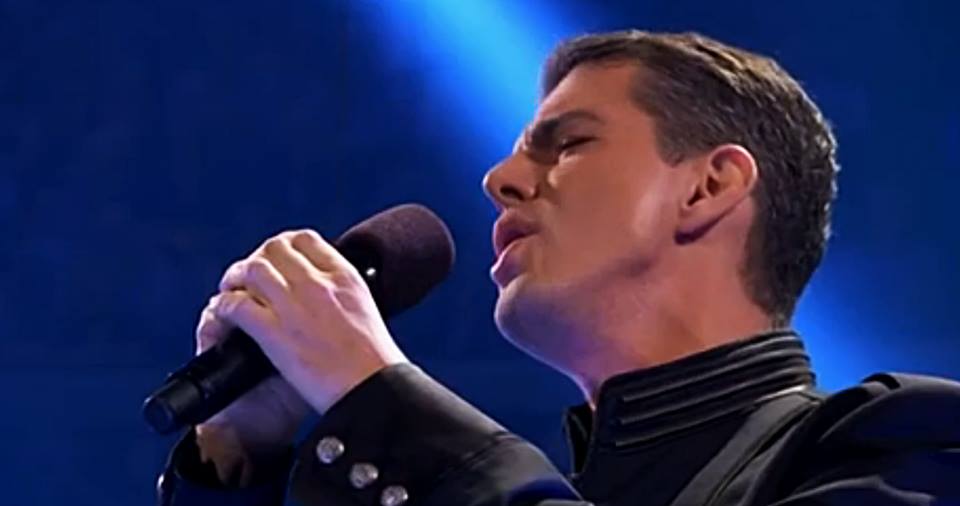
Klingt ganz einfach, wie Sie es gesagt haben – man muss es nur machen. Aber wenn man dann für Andreas Scholl auftritt, und die Leute haben eine bestimmte Erwartungshaltung, oder in Ulisse mit René Jacobs, ich meine, da sind ja Riesenerwartungen da. Wie gehen Sie damit um, wie sind Sie damit umgegangen, einfach doch mutig. Sie sind auch mutig.
Ich bin mutig, ja. Ich mag sehr, ein Risiko auf mich zu nehmen zum Beispiel. Was die Musik betrifft, habe ich auch Rollen gesungen, die zu schwer für mich waren, aber als Künstler muss man das. Und noch immer nehme ich Risiken in Kauf mit meinen Aufnahmen, ich versuche ein bisschen Überraschungen zu machen für mein Publikum. Zum Beispiel letzten Monat habe David Bowie gesungen und ich war der einzige Franzose, natürlich, es waren nur English people [laughs], und das war ein bisschen verrückt, aber ich habe es getan.
Sounds very simple when you say it – you only have to do it. However, when you stand in for Andreas Scholl, and people have certain expectations, or to sing in Ulisse with René Jacobs, there are huge expectations. How do you handle; how did you use to handle, I think bravely. You are brave as well.
I am brave, yes. I like it very much to take a risk, for example. Speaking about music, I have sung some roles that were above my level, but that’s what you have to do as an artist. I am still taking risks with my recordings; I try to keep surprising my audience a little. For example, last month, I have been singing David Bowie, and I was the only Frenchman, of course. There were only English people [laughs], and it was a little crazy. However, I did it anyway.
Was haben Sie gesungen?
“Always crashing in the same car” von David Bowie, aber das war ein toller Abend und das ist eine Möglichkeit, die ich nur einmal in meinem Leben hatte, und ich habe sie wahrgenommen.
Haben Sie besondere Erinnerungen an diesen Titel? Was verbinden Sie damit?
[ca 20 min]
Für mich, ich habe für das Projekt zugesagt weil wir immer sagen David Bowie war zwischen Frau und Mann. Aber nicht die Stimme. Für mich ist vielleicht das Gegenteil der Fall. Meine Stimme ist zwischen Frau und Mann. Ich hatte natürlich nicht die gleiche Kleidung wie er, aber diese Farbe eines Countertenors kann interessant sein in diesem Kontext. [edited]
What have you been singing?
“Always crashing in the same car” by David Bowie. It was a great night and it was a once in a lifetime kind of opportunity, so I seized it.
Do you have special memories attached to that title? What is your connection there?
I accepted the project because a lot of people say that David Bowie was between a woman and a man. However, that’s not true concerning his voice. For me, it’s maybe the opposite. My voice is in between a woman’s voice and a man’s. Of course, I didn’t have his clothing, but the colour of a countertenor can be very interesting in the context.
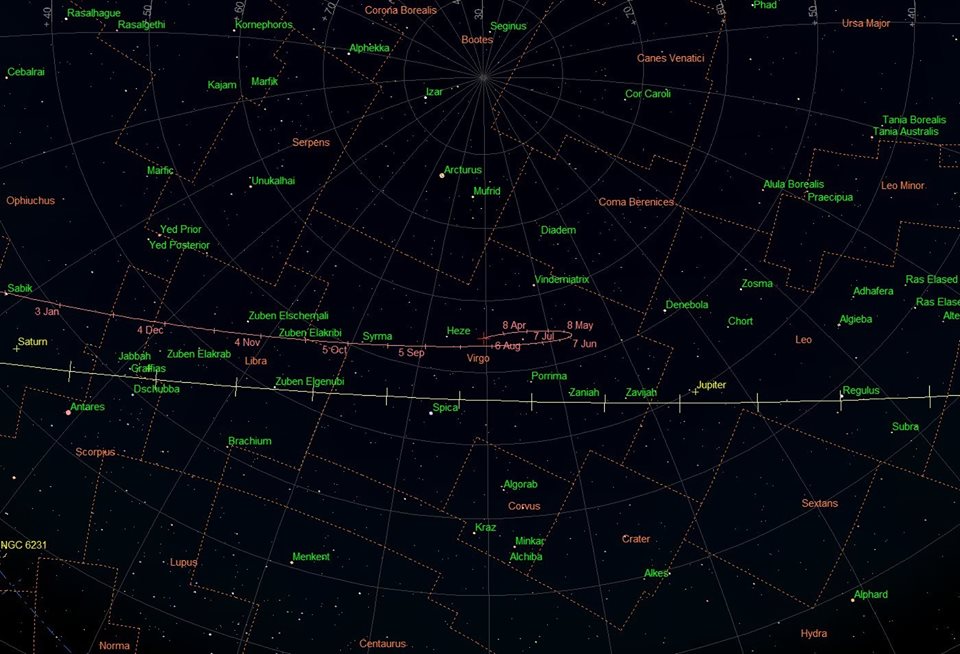
Herr Jaroussky, der Asteroid 332183 wurde nach Ihnen benannt – wie ist das gekommen?
Das weiß ich nicht, das war eine große Überraschung für mich, aber warum nicht, das finde ich ganz toll. Vielleicht hat der Mann, der diesen Asteroiden entdeckt hat, meine CDs zuhause, vielleicht.
Der fand Ihre Stimme einfach himmlisch.
Ja, aber himmlisch, für mich das ist nicht die einzige Qualität, die wir brauchen, um Sänger zu sein, ein klassischer, ein Opernsänger zu sein, wir müssen auch das Gegenteil, …
… Tiefe haben.
Ja.
… geerdet sein.
Ja, genau, und ich habe viel an diesem Punkt gearbeitet. Natürlich, meine Stimme klingt hoch, mit vielen Obertönen, …
… und sehr leicht.
Ja, aber das reicht nicht, um Barockmusik zu singen, natürlich. Und deshalb habe ich auch gewartet ein bisschen für Komponisten wie Händel und Bach. Natürlich, am Anfang ich habe viel mehr Vivaldi gesungen, aber ich fühlte, ich brauchte ein bisschen mehr Körper in meiner Stimme.
Mr. Jaroussky, the asteroid #332183 has been named after you. How did this come to pass?
I don’t know; it was a big surprise, but why not? I think it’s fantastic. Maybe the man who discovered that asteroid has my CDs at home, maybe.
He thought your voice was heavenly.
Yes but heavenly – for me that’s not the only quality we need to be a singer, a classical one, an opera singer, we need the opposite too, …
… depth.
Yes.
… be grounded.
Yes, exactly, and I have been working a lot on that. Of course, my voice is high, with a lot of overtones, …
… and it is very light.
Yes, but that’s not all you need to sing Baroque music, of course. Because of that, I have been waiting a little bit before I turned to composers like Händel and Bach. Of course, at the start I have been singing a lot more Vivaldi. However, I felt that I needed more body to my voice.
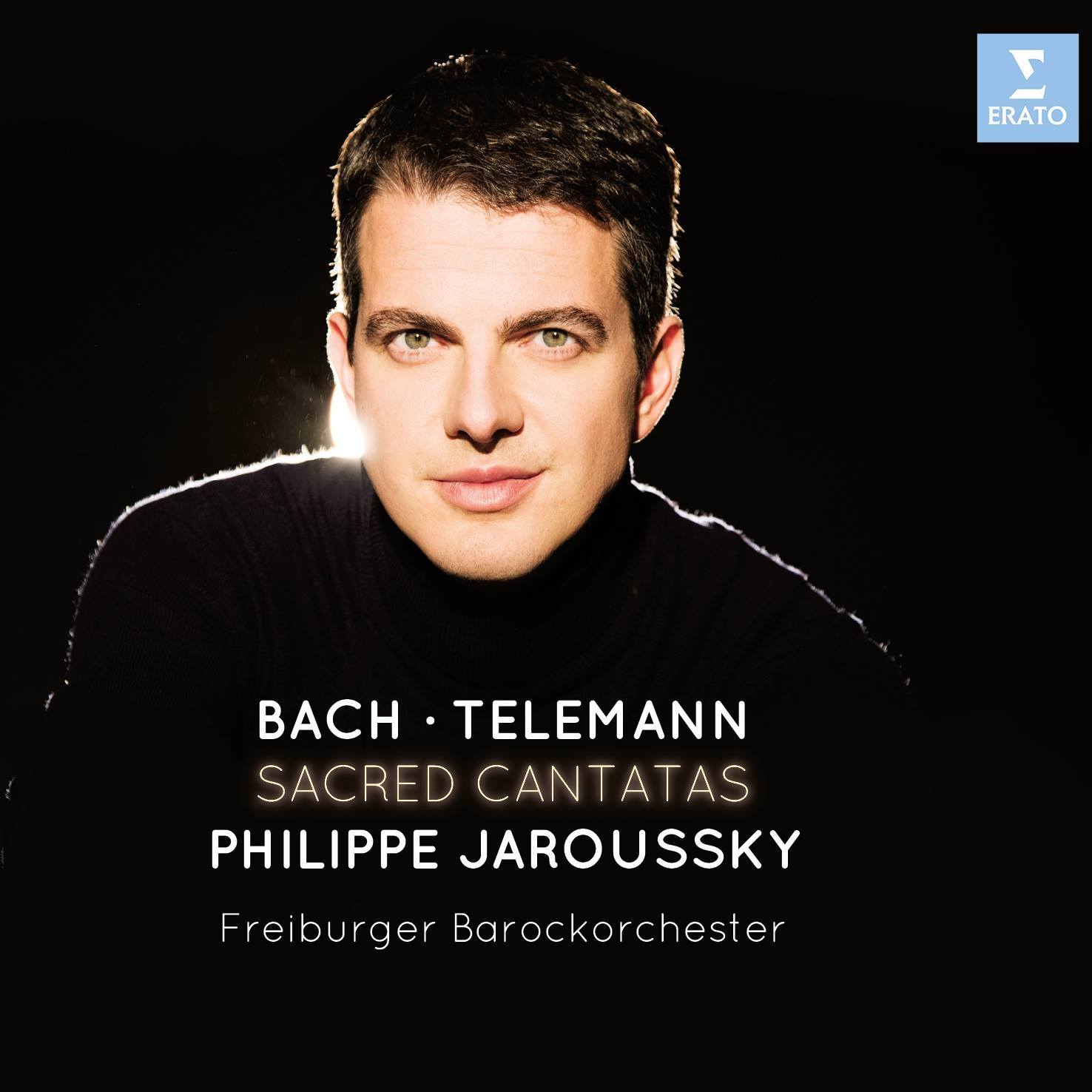
[21:30]
Sie haben jetzt Kantaten auf Deutsch aufgenommen, Bach und Telemann. Im nächsten Jahr, Telemann-Jahr, … wie war das für Sie, Deutsch zu singen, wie fühlt sich das an?
Ich habe Deutsch in der Schule gelernt. Deshalb war nicht so komisch für mich. Ich kenne diese Sprache. Aber natürlich, eine Sprache zu singen, das ist ganz anders. Ich musste ein bisschen mehr arbeiten. Die schwierigste Sache für mich war, Bach zu singen. Ich hatte immer Angst, Bach zu singen, und ich glaube, das ist ein bisschen dumm. Alle Leute haben ein bisschen Angst, weil die Kompositionen so perfekt sind. Die Musik ist so perfekt. Und bei den ersten Noten denken Sie “Oh, ich habe so scheiße gesungen.” Und ich wollte warten, aber nicht zu lange, und ich bin sicher, dass Bachs Musik auch sehr sehr frisch und sehr spontan, nicht nur kompliziert ist, aber ich wollte nicht nur Bach. Von Anfang an mag ich Telemanns Musik sehr. Natürlich wissen alle, dass er berühmter war als Bach, aber warum, das ist die Frage, und diese zwei Kantaten beantworten sie. Die Qualitäten von Telemanns Musik sind vielleicht, … die Musik ist einfacher, aber, die Melodien sind sehr eingängig. Ich bin sicher, dass ein paar Leute Telemann mehr mögen werden als Bach, vielleicht.
Sie haben jetzt schon sehr neugierig darauf gemacht, die CD werden wir natürlich Anfang Oktober vorstellen, hier auf NDR Kultur. Jetzt, in “Klassik à la carte,” haben wir die erste Arie aus der Kantate “Vergnügte Ruh, beliebte Seelenlust”, BWV 170, mit dem Freiburger Barockorchester.
Genau.
You have been recording cantatas in German, by Bach and Telemann. Next year, the Telemann-year, … how was that for for you, to sing German, how does it feel?
I have been learning German in school, and because of that it wasn’t this odd for me. I know this language. However, to sing in a language is yet different. I needed to work a little more. The most difficult thing for me was to sing Bach. I was always afraid to sing Bach, and I think that’s a little stupid. Everybody is a little afraid [when they sing Bach], because the compositions are this perfect. The music is perfect. And during the first notes you are thinking “Meh, I screwed it up.” I wanted to wait, but not too long, and I am sure that Bach’s music isn’t only complicated but can be very fresh and spontaneous. However, I didn’t want [to record] Bach only. Right from the start, I liked Telemann’s music a lot. Of course, everybody knows he was more famous than Bach [back then], but why, that is the question. I think the two cantatas provide an answer. The qualities of Telemann’s music are maybe, … the music is simpler, but the melodies are very catchy. I am sure that some people possibly will end up liking Telemann more than Bach.
You have made us very curious; we are going to review the CD at the start of October, here on NDR Kultur. Now, in “Klassik à la carte,” we have the first aria from the canatata “Vergnügte Ruh, beliebte Seelenlust”, BWV 170, with the Freiburg Baroque Orchestra.
Yes.
[Vergnügte Ruh]
[29:30]
“Vergnügte Ruh, beliebte Seelenlust” aus der gleichnamigen Kantate von Johann Sebastian Bach, BWV 170, und wir hörten einen Titel aus der noch nicht veröffentlichen Aufnahme mit Philippe Jaroussky, er ist heute unser Gast in Klassik à la carte auf NDR Kultur, weil er mit Thomas Hengelbrock und dem NDR Elbphilharmonie Orchester die Saison 2016/2017 eröffnen wird. Und da sind Sie nicht nur ein einmaliger Gast, Sie sind Artist in Residence für das nächste halbe Jahr. Was bedeutet Ihnen das, warum haben Sie das zugesagt?
Ich fühle, … ich kann sagen, ich fühle mich sehr glücklich. Letzte Saison ich war Artist in Residence in Berlin Konzerthaus und jetzt in Hamburg, in der NDR Elbphilharmonie. Für mich, diese zwei Einladungen nach Deutschland, … das ist meine neue Heimat, nach Frankreich. Und diese Residenz ist vielleicht eine Gelegenheit für das Publikum, mich besser kennenzulernen und deshalb wollte ich unterschiedliches Repertoire singen, wie in Berlin letztes Jahr, und ich glaube es ist sehr wichtig, zum Beispiel, ein Konzert auf Deutsch zu geben.
The eponymous “Vergnügte Ruh, beliebte Seelenlust” from the cantata BWV 170 by Johann Sebastian Bach, and we were listening to a track of the CD about to be released with Philippe Jaroussky. Today, he is our guest in “Klassik à la carte” on NDR Kultur because he is going to open the concert season 2016/2017 with Thomas Hengelbrock and the NDR Elbphilharmonie Orchester. There you are not only a one-time guests; you are Artist in Residence for the next half-year. What does this mean to you, why did you accept?
I feel, … I can say I am very happy. Last season I was Artist in Residence at the Konzerthaus Berlin, and now Hamburg, in the NDR Elbphilharmonie. For now, these two invitations to Germany, … it’s my new home, after France. Maybe this residency is an opportunity for the public to get to know me better, and therefore, I wanted to sing a variety of repertoire, like in Berlin during the last year. Also, I believe it is very important, for example, to do a concert in German.
Und das tun Sie am 08. November in der Reihe “Das Alte Werk”, nämlich genau dieses Programm, was auf CD veröffentlicht wird. Und, wir gehen nochmal einen Schritt voraus, am 11./12. Januar werden Sie die Elbphilharmonie miteröffnen.Was bedeutet Ihnen das?
Das ist unglaublich, ich glaube natürlich, für mich ist es eine große Ehre. Ich war nicht zur Eröffnung der Pariser Philharmonie eingeladen [laughs], und ich bin sicher, dass es die einzige Möglichkeit in meinem Leben ist, einen so großen Saal einzuweihen. Und Thomas Hengelbrock hat mir gesagt, er wolle alle Möglichkeiten dieses Saals zeigen und nicht nur mit großem Orchester. Dann, das kann ich nicht alles sagen, aber ich werde etwas ganz Besonderes für diese Eröffnung singen.
And this you are going to do on November the 8th, in the series “Das Alte Werk,” the very program that is going to be released on CD. Let’s skip one step forward: on January the 11th and 12th, you are going to participate in the inauguration of the Elbphilharmonie. What does this mean to you?
It is incredible. I perceive it as a great honour. I wasn’t invited to the inauguration of the Paris Philharmonic [laughs], and I am sure that this is the only opportunity I am going to get in my life to inaugurate a concert hall this vast. Thomas Hengelbrock told me he was going to show all the possibilities of the hall, not only with a big orchestra. Then, … I can’t tell it all, but I am going to sing something very special at the inauguration.
Was war bis jetzt der schönste Saal, in dem Sie gesungen haben?
Es gibt einen Saal, der gefällt mir sehr, es ist La Sala São Paulo, in São Paulo, unglaublich. Für mich ist es schwer, das so zu sagen, für mich ein Konzerthaus ist nichts ohne das Publikum. Das Publikum ist sehr wichtig und es gibt verschiedene Arten Publikum. Aber ich mag es sehr, zum Beispiel, nach Südamerika zu kommen. Das Publikum ist unglaublich und für mich ist ganz interessant außerhalb von Europa zu singen, auf der anderen Seite der Welt zu singen.
What was the most beautiful location you have been singing in?
There is a concert hall I really like, the Sala São Paulo, in São Paulo – incredible. For me it’s difficult to choose there; for me, a concert hall is nothing without the audience. The audience is very important and there are different kinds of audiences. I like it a lot, for example, to come to South America. The audience is fantastic, and for me it’s always interesting to sing outside Europe, on the other side of the world.
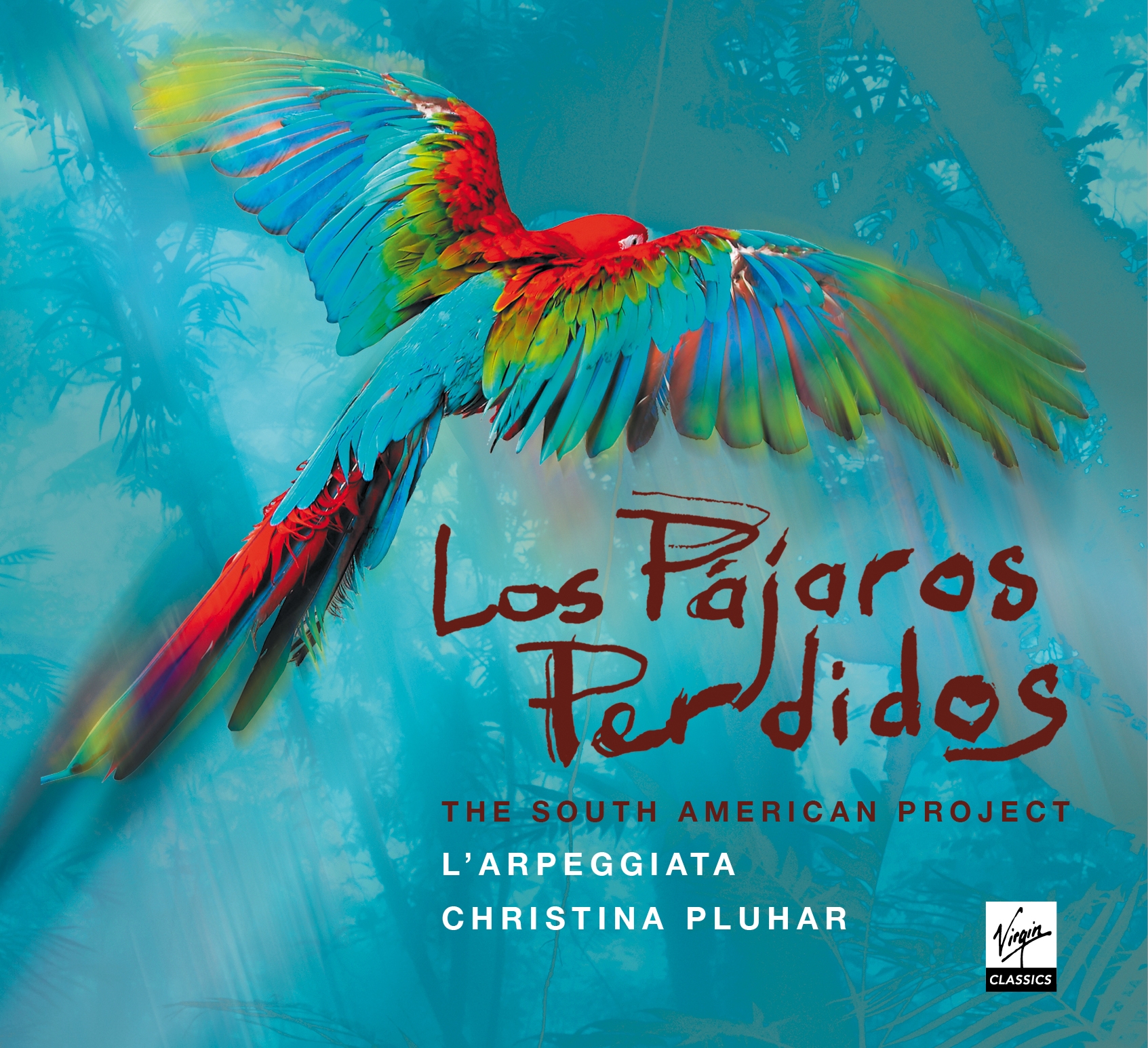
[32:25]
Sie haben ein ganzes Südamerika-Programm gemacht, daraus ist auch der nächste Titel, “Como La Cigarra”. Wie ist dieses Programm entstanden?
Das ist Christina Pluhar natürlich und ich habe viel viel mit ihr gearbeitet und sie hat gesprochen über das Projekt und natürlich es gab Lieder, die ich überhaupt nicht singen wollte, weil sie haben den Schatten von Mercedes Sosa, der wunderbaren Mercedes Sosa.
… projiziert in den Raum.
Ja, zum Beispiel “Gracias a la vida”, I didn’t want, … no lo quería cantar. [laughs]
You have been doing a whole program dedicated to South America. The next piece we are going to here is taken from it, “Como la Cigarra.” How did this project evolve?
That is Christina Pluhar, of course, and I have been working with her a lot. She talked about the project, … and there were songs that I didn’t want to sing, because it’s hard living in the shadow of Mercedes Sosa, the wonderful Mercedes Sosa.
… projected into the room.
Yes, for example “Gracias a la vida,” … I didn’t want, … no lo quería cantar. [laughs]
Warum diese Projekt? Vielleicht, ja, ich bin sicher, dass die Countertenorstimme viel mehr singen kann als Leute denken. Und jedesmal will ein Dirigent von mir, dass ich wieder etwas anderes singe.
Ja, weil Sie so flexibel sind, und offensichtlich dieses Lebensgefühl immer gleich mittragen.
Und vielleicht weil Countertenorstimmen nicht nur für die Oper geeignet sind. Vielleicht. Es gibt einen anderen Punkt. Es ist die gleiche Sache für Andreas Scholl, für viele Countertenöre: Es klingt nicht wie ein Opernsänger. Dann können wir vielleicht auch ein anderes Repertoire singen.
Why this project? Maybe, yes, … I am sure that a countertenor voice can sing a lot more than people think. And every time, the conductor wants me to sing something else yet again.
Yes, because you are so flexible, and obviously, you seem to bring the right spirit every time.
And maybe because countertenor voices aren’t only suitable for opera. Maybe. There is another point, and it’s the same for many countertenors. It doesn’t sound like an opera singer. So maybe we can sing a different repertoire too.
Und es geht schon eine bestimmte Faszination von dieser Stimme aus. Als Sie gemerkt haben, dass Sie so eine Stimme haben, wie war das für Sie, was ist das für ein Gefühl, eine solche Stimme zu haben?
[34 min]
Das Gefühl war am Anfang nur Freude. Natürlich, um diesen Beruf zu machen brauchen Sie nicht nur Freude, weil nach ein paar Konzerten beginnen Sie, Angst zu haben, und das ist ganz normal. Und Technik ist da für Angst. Sie müssen Ihre Stimme stärken, weil Sie müssen jeden Abend singen, und das ist nicht einfach. Am Anfang war es gut, aber nach drei Jahren erinnere ich mich an Schwierigkeiten, die ich auf der Bühne hatte; ich habe ein paar Konzerte abgesagt. Das war nicht einfach. Aber jetzt fühle ich mich stärker.
And there is a certain fascination about this voice type. When you realized you have a voice like this – how was that for you? What kind of feeling is it to have a voice like that?
At the start, it was pure joy. Of course, to be active in this profession, you don’t only need joy in what you are doing, because after a few concerts, you start to be afraid, and that’s completely normal. And technique is there for the times you are afraid. You have to train your voice because you have to sing every night, and that isn’t easy. At the start, it was fine, but after three years I remember having some difficulties on stage. I cancelled a few concerts; that wasn’t an easy decision. Now I’m feeling stronger.
Haben Sie gute Berater, die sagen “Mach nicht so viel, mach vielleicht dies doch nicht”?
Ich habe dieselben vom Anfang. Ich habe meine Lehrerin, dieselbe für 20 Jahre, Nicole Fallien, und ich arbeite noch viel mit ihr wenn ich in Paris bin, ich rufe sie an und ich brauche zwei Stunden, und das ist genug um die Stimme wieder frisch zu bekommen.
Wunderbar, sie hat ja Ihre Stimme quasi auch entdeckt.
Ja, mein erster Kurs war mit ihr. Daher kennt sie mich sehr sehr gut. Wie eine Mutter. Und sie weiß mehr als alle anderen, was kann ich tun in der Zukunft oder nicht. Und wenn ich nicht weiß, ob ein Stück etwas für mich ist, dann sagt sie mir du kannst es schaffen oder nicht. Das ist sehr wichtig. Ich habe auch den gleichen Agenten in Frankreich und ich habe die gleiche Plattenfirma, vorher war es Virgin, jetzt ist es Warner, aber es sind die gleichen Leute.
Do you have good advisers who tell you “Don’t do so much,” or “Maybe don’t do this”?
I have the same advisers since when I started. I have my teacher, the same for 20 years now, Nicole Fallien, and I am still working a lot with her whenever I come to Paris. I call her and I need two hours, and that’s enough to make my voice feel fresh again.
That’s great. She kind of discovered your voice too.
Yes, my first course was with her, that’s why she knows me very very well. Like a mother. And she knows more than anyone else what I can do or can’t do in the future. If I am unsure whether a piece is suitable for me or not, she is going to tell me whether I can do it or not. That’s very important. Also I still got the same agent in France, and the same record label. Before it was Virgin, now it is Warner, but it’s still the same people.
Brauchen Sie diese Sicherheit um sich herum?
Vielleicht? Ich sage immer, wenn es geht, warum wechseln. Und natürlich, das ist eine Sicherheit für mich.
Das heißt aber auch, Sie sind auch treu.
Vielleicht, ich weiß es nicht. [laughs]
Do you need this kind of secure environment?
Maybe? I’m always saying, if it works out, why change? And of course, it is a kind of safety for me.
Which also means you are faithful.
Maybe, I don’t now. [laughs]
[Como la cigarra]
[39:40]
Das Ensemble L’Arpeggiata unter der Leitung von Christina Pluhar mit “Como la cigarra” von Maria Elena Walsh, und gesungen haben Philippe Jaroussky und Raquel Andueza. Und Philippe Jaroussky ist heute hier und heute Abend bei der Opening Night von Thomas Hengelbrock und dem NDR Elbphilharmonie Orchester. Dort unternehmen Sie eine Reise durch die französische Musikgeschichte, vom 18ten bis zum 21ten Jahrhundert, und obwohl Sie dieses Mal zum ersten Mal mit Thomas Hengelbrock zusammenarbeiten, ist das schon wieder etwas, das Sie miteinander verbindet, weil ich glaube, Sie lieben thematische Programme.
Ja das stimmt. Ja. Von Anfang, ich versuche immer, nicht immer, aber manchmal, ein thematisches Programm, für eine CD zum Beispiel. Die erste Aufnahme, sehr wichtig für mich, war “Carestini”, es war “Die Geschichte eines Kastraten”, und er war nicht so berühmt. Ich glaube, er ist ein bisschen mehr berühmt jetzt, wie Farinelli, und ich glaube, das ist gut, die Geschichte zu erklären, …
The Ensemble L’Arpeggiata, conducted by Christina Pluhar, with “Como la cigarra” by Maria Elena Walsh; the singers were Philippe Jaroussky and Raquel Andueza. Philippe Jaroussky is here today, and tonight at the Opening Night by Thomas Hengelbrock and the NDR Elbphilharmonie Orchester. There you are going to do a voyage through French music history, from the 18th to the 21th century, and despite you working with Thomas Hengelbrock for the first time, this is something else that connects the two of you, because I think you love thematically connected programs.
That’s correct, yes. From the start, I tried, not always but sometimes, to do a program that is thematically connected, for a CD for example. The first recording, very important for me, was “Carestini”, this was “The Story of a Castrato,” and he wasn’t so famous. I believe he is a bit more famous now, like Farinelli, and I think it was a good way to explain the story.
Ihre beiden Alben “Opium” und “Green”, wie sind die entstanden?
“Opium” war die erste mit französischen Liedern, und es klang gut, “Opium”. “Green” es ist nur Dichtungen von Paul Verlaine, und das ist ein sehr großes Projekt für mich. Das sind zwei CDs, zwei Stunden Musik, und mit Komponisten so verschiedene wie Fauré, Debussy, aber auch zum Beispiel Georges Brassens oder Leo Ferre, oder zum Beispiel Charles Trenet.
Also wieder einmal über den Dichter Verlaine kann man Grenzen sprengen, können Sie mit Ihrer Countertenorstimme ganz neue Bereiche für sich entdecken.
Ja, und für dieses Projekt “Green” was zum Beispiel unglaublich ist, ist die gleiche Dichtung mit verschiedener Musik. Und das war Thema dieser CD, und Sie können für die gleiche Dichtung eine sehr leichte Musik und eine sehr berührende Musik, sehr traurige Musik, und eins für die gleiche Dichtung, es ist unglaublich.
“Chanson d’automne” von Verlaine, jetzt in der Fassung von Charles Trenet.
Your two albums “Opium” and “Green,” how did they evolve?
“Opium” was the first with French songs, and it had a nice ring to it, “Opium.” “Green” only comprises musical settings to poems by Paul Verlaine, and that was a huge project for me. It is two CDs, two hours of music, and with composers as different as Fauré, Debussy, but also, for example, Georges Brassens or Leo Ferré or Charles Trenet.
So, once more, via the poet Paul Verlaine, you crossed borders, and were able to discover entirely new fields with your countertenor voice.
Yes, and for this project, “Green,” what is amazing is the same poem in different settings. And this was the underlying topic of the CD. You can listen to settings of one poem, one very light and easy, one very touching, one very grave and sad – it’s incredible.
“Chanson d’automne” by Verlaine, now in the version by Charles Trenet.
[Chanson d’automne]
[44:40]
Was für eine wunderbare Atmosphäre mit dem Quatuor Ébène und Jérôme Ducros mit diesem “Chanson d’automne” von Charles Trenet, und gesungen hat es Philippe Jaroussky. Heute Abend um 19:00 in der Opening Night mit dem NDR Elbphilharmonie Orchester und Thomas Hengelbrock und jetzt noch bei uns bei “Klassik à la carte” auf NDR Kultur. Wenn Sie entspannen, wenn sie ausruhen, was tun Sie?
Mein Leben ist nicht ein ganz normales Leben, natürlich. Denn zum Beispiel, wenn ich zurück nach Hause komme, will ich ganz normale Sachen machen. Ins Restaurant mit Freunden, Kino, aber was soll ich sagen, nach zwei, drei Wochen zuhause will ich wieder reisen, das ist eine Droge für mich zu reisen. Und deshalb, zum Beispiel, in 2019, das ist das erste Mal ich sage es, ich werde eine Pause von sechs Monaten machen. Ich will reisen, aber ohne zu singen.
Andere Kulturen kennenlernen, …
Ja und es ist etwas anderes. Wenn ich singe, treffe ich Leute, aber mit einer Grenze, weil ich bin der Musiker, ich bin der Sänger. Aber wenn ich nur im Urlaub bin, bin ich wie die anderen, und ich habe nicht mehr diese Grenze, die ich manchmal fühle.
What a wonderful atmosphere with the Quatuor Ébène and Jérôme Ducros with this “Chanson d’automne” by Charles Trenet. The singer was Philippe Jaroussky. Tonight at 19:00, at the opening night with the NDR Elbphilharmonie Orchestra and Thomas Hengelbrock, and now still with us at “Klassik à la carte” at NDR Kultur. When you relax, when you chill, what do you do?
My life isn’t quite a normal one, of course. For example, when I come back home, I want to do normal things. I go to the restaurant with friends, or to the cinema. However, what shall I say, after two or three weeks at home, I want to be on the road again. It’s like a drug for me. Therefore, for 2019 – and that’s the first time I am telling this – I am planning a six-months break. I want to travel, but without singing.
To get to know different cultures, …
Yes and it’s something different. When I sing, I meet people, but with a boundary, because I am the musician, the singer. However, when I am on holiday, I am like everyone else, and I don’t feel to have this boundary any more I can sense sometimes.
Sie lieben Entertainment.
Ja ich habe das bemerkt diese letzten 15 Jahre auf der Bühne. Natürlich, klassische Musik ist ganz seriös. Aber manchmal am Ende des Konzertes, es ist sehr gut ein bisschen mehr Entertainment zu geben, und ich habe bemerkt, dass das Publikum sich das wünscht. Manchmal haben die Leute ein Ticket bereits ein Jahr lang für ein bestimmtes Konzert und sie warten auf diesen Moment. Und das ist eine Kommunion zwischen Sänger und Publikum, und es ist ein Fest. Ich bin so, so froh, wenn das Publikum lacht, zum Beispiel am Ende des Konzerts, das finde ich ganz toll.
Deshalb wissen wir jetzt alle, dass Sie ganz genau richtig sind heute Abend für die Opening Night mit Thomas Hengelbrock und dem NDR Elbphilharmonie Orchester, denn das liebt auch Thomas Hengelbrock. Er hat eingeladen zu einer französischen Affäre und Sie sind mittendrin. Sie sind für das nächste halbe Jahr, für diese Konzertsaison, wenn man das so sagen darf, die französische Affäre des NDR und wir freuen uns auf Sie und es werden sicher noch mehr Leute sich in Sie verlieben und ihre Vielseitigkeit. Ganz herzlichen Dank, Philippe Jaroussky, für diese wunderbare Gespräch.
Vielen Dank, ich freue mich sehr!
You love entertainment.
Yes, I realized this during the past 15 years on stage. Of course, classical music is a very serious business. However, sometimes, at the end of the concert, it is good to give a little more entertainment, and I realized that this is what the audience appreciates. Sometimes, people buy a ticket a year in advance, and long for that moment. It’s a communion between the singer and the audience, and it is a feast. I am so, so happy when the audience is laughing, for example at the end of the concert, I love that.
Now we’re sure you’ve come to the right place, tonight, at the opening night with Thomas Hengelbrock and the Elbphilharmonie Orchester, because this is what Thomas Hengelbrock loves as well. He invited to a “French affair,” and you are right in the middle. For the next half-year, for this concert season, if I am allowed to put it that way, you are the NDR’s French affair, and we’re greatly looking forward to you. We’re sure even more people are going to fall in love with you and your versatility. Thank you a lot, Philippe Jaroussky, for this wonderful conversation.
Many thanks, I’m looking forward to it as well!

